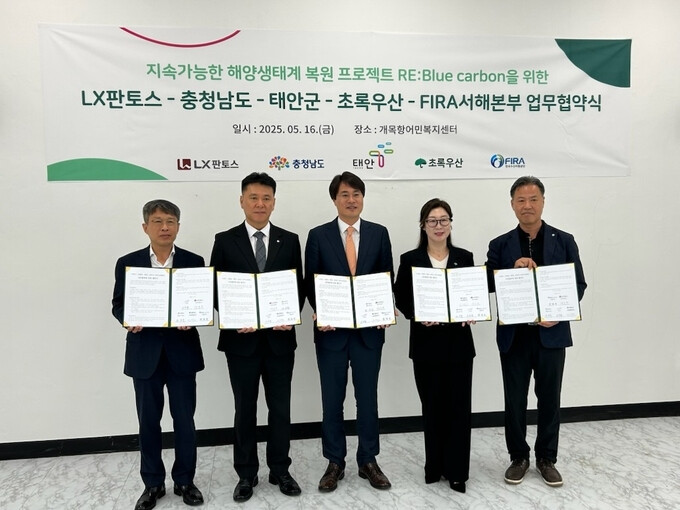
Taean, South Korea – Chungcheongnam-do (South Chungcheong Province) is spearheading efforts to restore carbon-neutral marine ecosystems through a collaborative initiative with private enterprises. The province recently signed a Memorandum of Understanding (MOU) with LX Pantos, Taean County, ChildFund Korea, and the Korea Fisheries Resources Agency (FIRA) to promote the creation of "sea forests."
The signing ceremony, held on May 16th at the Gaemok Port Fishermen's Welfare Center in Taean County, signifies a joint commitment to expanding carbon sinks and revitalizing marine ecosystems. Under the agreement, the participating organizations will focus on transplanting seagrass (Zostera marina) and conducting marine environment purification activities, thereby embodying corporate social responsibility.
LX Pantos, a leading global logistics company, will actively involve its employees in the project and provide financial and logistical support. FIRA will be responsible for planning and executing seagrass transplantation and experiential events as part of the initiative. ChildFund Korea will oversee the overall planning, operation, and budget management of the project. Chungcheongnam-do and Taean County will facilitate the smooth implementation of the project by seeking cooperation from local administrative bodies and supporting linkages with relevant government programs.
Following the MOU signing, approximately 50 attendees, including Jeon Sang-wook, Director-General of Chungcheongnam-do's Fisheries and Maritime Affairs Bureau, Maeng Yoon-joo, Head of LX Pantos' Management Support Division, Lee Joo-young, Deputy Governor of Taean County, Shin Jeong-won, Head of ChildFund Korea's Social Contribution and Cooperation Division, Yang Jeong-gyu, Head of FIRA's West Sea Headquarters, and local residents, participated in seagrass transplantation and marine environment cleanup activities at Uihang Beach.
Chungcheongnam-do has been actively engaged in sea forest creation projects since 2008, investing approximately 8.2 billion KRW (around 6.1 million USD), including 5.8 billion KRW in national funds and 2.4 billion KRW in provincial funds. These efforts have involved installing artificial reefs and natural stones to establish thriving underwater habitats.
To date, the province has successfully created sea forests in various locations, including 88.19 hectares in Hodo Island, 79.3 hectares in Sapsido Island, 4 hectares in Jukdo Island (all in Boryeong), 2 hectares in Padori and 2 hectares in Uihangri (both in Taean), and 2 hectares in Janggo Island (Boryeong). The province aims to complete the creation of an additional 8.4 hectares in Hagampo (Taean) within this year and 156 hectares in Oeyeondo Island (Boryeong) by 2027.
Director-General Jeon Sang-wook emphasized the significance of the collaboration, stating, "This partnership with private enterprises will simultaneously contribute to the restoration of marine ecosystems and the practice of ESG management. We will continue to pursue diverse public-private partnerships to realize a carbon-neutral society."
Background and Significance:
The establishment of "sea forests," primarily composed of seagrass and kelp, is gaining increasing recognition as a crucial strategy for mitigating climate change and enhancing marine biodiversity. Seagrass meadows and kelp forests are highly productive ecosystems that play a vital role in absorbing atmospheric carbon dioxide, often referred to as "blue carbon." Their capacity to sequester carbon can be significantly higher than that of terrestrial forests on a per-area basis.
Beyond carbon sequestration, these underwater forests provide essential habitats and nursery grounds for a wide array of marine organisms, contributing to increased fish stocks and overall ecosystem health. They also help to improve water quality by filtering pollutants and stabilizing sediments, protecting coastlines from erosion.
Chungcheongnam-do's proactive approach aligns with South Korea's national commitment to achieving carbon neutrality by 2050. The involvement of LX Pantos demonstrates a growing awareness among corporations regarding their environmental responsibility and the potential for contributing to nature-based climate solutions. ChildFund Korea's participation highlights the importance of engaging the community and fostering environmental stewardship across different sectors. The technical expertise of the Korea Fisheries Resources Agency is crucial for the successful implementation of seagrass transplantation and habitat restoration efforts.
The selection of seagrass (Zostera marina) for this project is noteworthy. Seagrasses are flowering marine plants that form extensive meadows in shallow coastal waters. They are particularly effective carbon sinks and provide critical habitat for numerous commercially important fish and shellfish species. However, seagrass ecosystems globally have been facing significant decline due to various anthropogenic pressures, including coastal development, pollution, and climate change.
The ongoing efforts by Chungcheongnam-do to expand sea forest areas reflect a long-term vision for sustainable coastal management and the recognition of the ecological and economic benefits these ecosystems provide. The province's experience in artificial reef installation further complements the seagrass restoration initiative, creating a multi-faceted approach to enhancing marine biodiversity and resilience.
This collaborative endeavor serves as a model for other regions seeking to leverage public-private partnerships in addressing the urgent challenges of climate change and marine ecosystem degradation. By combining the resources and expertise of government agencies, corporations, NGOs, and research institutions, Chungcheongnam-do is positioning itself as a leader in the transition towards a carbon-neutral and ecologically vibrant marine environment. The active participation of local communities in these initiatives is also crucial for long-term success, fostering a sense of ownership and responsibility for the health of their coastal ecosystems.
[Copyright (c) Global Economic Times. All Rights Reserved.]






























